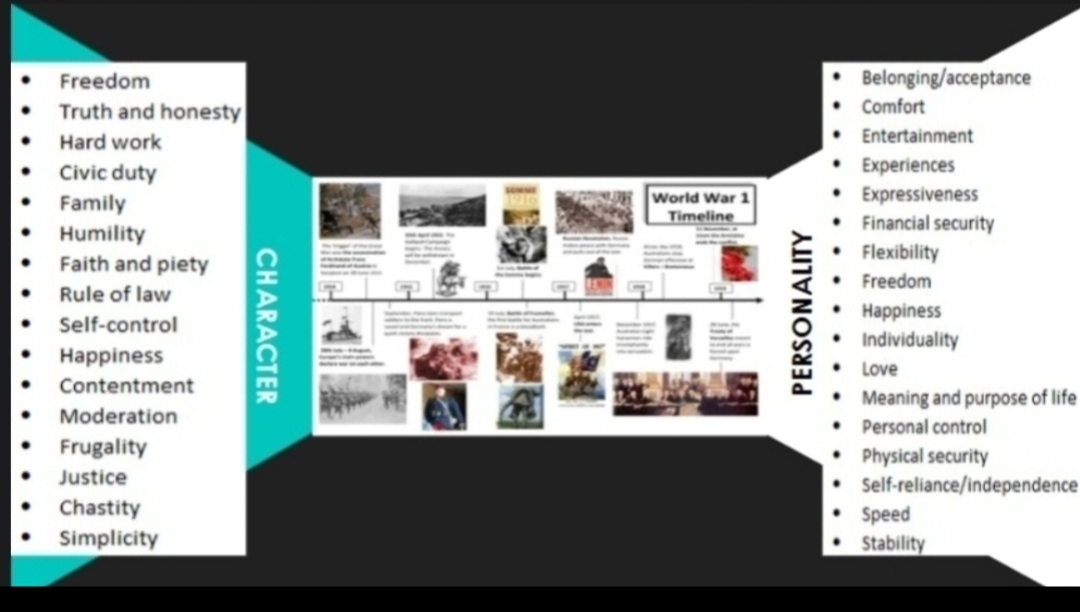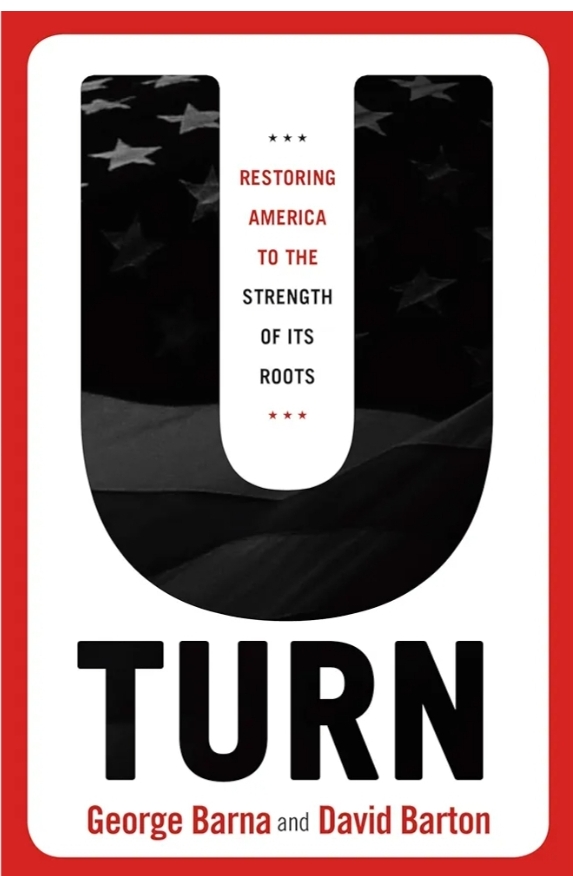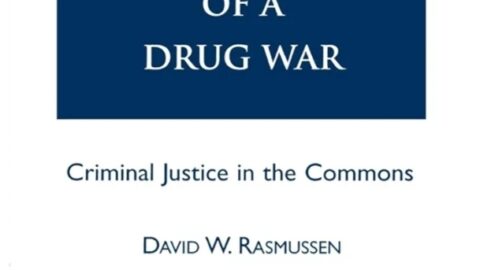U-Turn: Restoring America to the Strength of Its Roots
By David Barton & George Barna
Overview
U-Turn: Restoring America to the Strength of Its Roots examines the moral, spiritual, and cultural decline of the United States and argues that America must return to its foundational biblical and constitutional principles to regain its former strength. Authors David Barton, a well-known historian and Christian activist, and George Barna, a respected pollster and researcher, use historical analysis and statistical data to demonstrate how American values have eroded over time. They argue that this decline threatens the nation’s future and call for a cultural and spiritual revival.
Key Themes and Arguments
America’s Founding Principles and Their Decline
- Barton and Barna emphasize that the U.S. was founded on Judeo-Christian principles, which shaped its legal and cultural institutions.
- They argue that the Founding Fathers envisioned a society guided by moral absolutes, personal responsibility, and a reliance on divine guidance.
- Over time, America has moved away from these principles, replacing objective moral standards with relativism and secularism.
The Shift Away from Biblical Morality
- The authors use statistical data to show how American society has changed:
- Decline in church attendance
- Breakdown of the traditional family unit
- Increase in crime, divorce, and moral relativism
- Rising government dependence and entitlement mentality
- They argue that as faith in God and biblical principles decline, so does national unity, economic prosperity, and moral integrity.
The Role of Education and the Church
- Barton and Barna assert that public education has contributed to the moral decline by removing religious and historical truths from school curricula.
- They claim that revisionist history has downplayed the religious motivations of America’s founders.
- The church, which once played a central role in shaping public morality, has become passive and compromised, avoiding controversial issues like abortion, marriage, and religious liberty.
Political and Cultural Consequences
- The book discusses how progressive policies have led to increased government control, moral decay, and economic instability.
- Barton and Barna argue that secularism has led to the erosion of religious freedoms, with Christian values being marginalized in politics, media, and education.
- They warn that if America continues on its current trajectory, it will lose the freedoms and prosperity that once made it exceptional.
A Call to Action: How to Restore America
The authors outline practical steps to help restore the country:
- Return to Biblical Morality – Individuals and families must live according to biblical values.
- Strengthen the Church’s Role – Pastors and churches must actively engage in cultural and political issues.
- Revise Education – Schools should teach accurate history and restore moral instruction.
- Civic Engagement – Christians must vote, participate in government, and defend religious liberty.
- Strengthen Families – Parents must teach children biblical values and personal responsibility.
Comparison to Other Books
- U-Turn shares similarities with books like The Fourth Turning (Strauss & Howe) and The Speed of Trust (Stephen M.R. Covey) in that it discusses societal decline and potential renewal.
- It aligns with conservative Christian books like The Harbinger (Jonathan Cahn) and America’s Expiration Date (Cal Thomas), which argue that America’s future depends on returning to its moral and religious roots.
- Unlike purely historical or economic analyses, U-Turn blends historical data, religious conviction, and social commentary to advocate for a national transformation.
Criticism & Controversy
- Some critics argue that Barton’s historical interpretations overemphasize the religious intentions of the Founding Fathers and downplay the role of Enlightenment ideas.
- Others believe the book oversimplifies complex social changes and focuses too much on returning to a past that may not be fully recoverable.
- Secular and progressive readers argue that the book promotes a Christian nationalist perspective, favoring religious influence over pluralistic governance.
U-Turn: Restoring America to the Strength of Its Roots is a call to action for conservative Christians who believe America has lost its moral foundation. It combines historical evidence, polling data, and biblical teachings to argue that a spiritual and cultural revival is necessary for national renewal. While controversial, the book resonates with readers who seek a return to traditional values, strong families, and religious influence in public life.

Different Value Systems: Past vs. Present in U-Turn: Restoring America to the Strength of Its Roots
In U-Turn, David Barton and George Barna compare historical American values with modern values, arguing that a shift from biblical morality and traditional virtues to secularism and relativism has weakened the nation. They use historical data, polling, and cultural analysis to highlight these changes.
Morality & Ethics
Past (Biblical & Absolute Morality)
- Morality was largely based on Judeo-Christian principles and biblical commandments.
- There was a clear distinction between right and wrong, with moral absolutes guiding personal and societal behavior.
- Honesty, integrity, and personal accountability were central virtues.
- Concepts like sin, repentance, and redemption were widely accepted in public and private life.
- Example: Lying, stealing, and adultery were considered immoral and shameful, both socially and religiously.
Present (Moral Relativism & Secularism)
- Morality is now viewed as subjective and situational, rather than based on universal truths.
- Right and wrong are seen as personal choices, influenced by culture rather than divine law.
- “Tolerance” and “inclusivity” are prioritized over moral absolutes.
- Ethical decisions are often guided by personal feelings, societal trends, or political ideology rather than religious principles.
- Example: Actions like lying or cheating may be justified based on personal or professional gains rather than absolute moral standards.
Family & Marriage
Past (Traditional & Biblical Family Structure)
- Marriage was seen as a lifelong covenant between a man and a woman, rooted in faith and social stability.
- Two-parent households were the norm, with clear roles for fathers and mothers.
- Raising children with moral discipline, respect, and responsibility was a primary goal.
- Family was regarded as the foundation of a stable society.
- Example: Divorce was rare and considered a last resort; children were raised with strong religious and moral teachings.
Present (Redefinition of Family & Breakdown of Marriage)
- Marriage is seen as optional or redefined to include non-traditional relationships.
- High divorce rates and single-parent households have become more common.
- Many view marriage as a contract based on personal happiness rather than a sacred covenant.
- Society promotes self-fulfillment over family responsibility.
- Example: Cohabitation before marriage is widely accepted; raising children without a stable two-parent home is normalized.
Education & Knowledge
Past (Faith-Based, Classical Education & Critical Thinking)
- Schools integrated moral instruction and biblical values into education.
- The purpose of education was to cultivate wisdom, virtue, and personal responsibility.
- Students were taught critical thinking and classical knowledge based on history, philosophy, and religious teachings.
- Example: The Bible and religious texts were commonly used in schools to teach ethics, discipline, and literacy.
Present (Secular & Progressive Education)
- Education has shifted towards secularism, removing religious influence from curricula.
- The focus has shifted to career success, self-esteem, and political activism rather than moral character development.
- Many schools promote progressive ideologies that challenge traditional religious and historical narratives.
- Example: Prayer and religious symbols have been removed from public schools; history is often rewritten to align with modern social justice perspectives.
Government & Freedom
Past (Limited Government & Individual Responsibility)
- The Founding Fathers emphasized small government, individual liberties, and personal responsibility.
- Rights were seen as God-given and protected by the Constitution.
- The government’s role was to protect freedoms, not control lives.
- Patriotism and civic duty were seen as responsibilities of every citizen.
- Example: The government stayed out of religious and personal matters, allowing communities to self-govern.
Present (Big Government & Dependence)
- Government is increasingly seen as the provider of rights and solutions to societal problems.
- People are more dependent on welfare, subsidies, and regulations rather than self-reliance.
- Freedoms are being eroded in the name of safety, equity, and social justice.
- Many citizens see government intervention as necessary, even at the cost of personal liberties.
- Example: Increased surveillance, political correctness, and restrictions on religious expression in public spaces.
Religion & Faith
Past (God-Centered Society & Religious Freedom)
- The U.S. was founded on religious freedom, but faith was deeply integrated into public life.
- Christianity and biblical values shaped laws, education, and culture.
- Church attendance was high, and religious faith was widely respected.
- Religious organizations played a key role in charity, education, and social stability.
- Example: Presidents and government officials openly acknowledged God in speeches and policies.
Present (Secularism & Hostility Toward Faith)
- Religion is increasingly seen as private, outdated, or even oppressive.
- Christianity is often marginalized, while secular and progressive worldviews dominate culture and policy.
- Faith-based perspectives on morality, life, and family are ridiculed or censored in media and education.
- Example: Christian businesses face lawsuits for refusing to comply with laws that violate their religious beliefs.
Work Ethic & Economy
Past (Hard Work, Self-Reliance, & Free Enterprise)
- The traditional Protestant work ethic emphasized hard work, perseverance, and self-sufficiency.
- Economic success was seen as a byproduct of personal effort and responsibility.
- Capitalism and free markets were viewed as ways to create prosperity and reward innovation.
- Example: People took pride in building businesses and working their way up without relying on government assistance.
Present (Entitlement Culture & Economic Dependence)
- Many believe that the government or society owes them a living.
- There is an increasing push for wealth redistribution, government handouts, and universal basic income.
- Hard work is sometimes seen as oppressive or unnecessary, while social justice movements push for economic equity over merit-based success.
- Example: Growing dependence on government aid, rising support for socialism, and disdain for traditional capitalist principles.
Conclusion: A Call for Restoration
Barton and Barna argue that America has drifted away from faith, family, morality, and personal responsibility, leading to cultural decay. They believe that restoring biblical values, strengthening the family unit, and reducing government control are key to reversing this decline. The book calls on individuals, churches, and policymakers to take responsibility for returning America to its moral and spiritual foundations.







One Response
Love that all the solutions are the beliefs of The Church Of Jesus Christ Of Latter Day Saints!